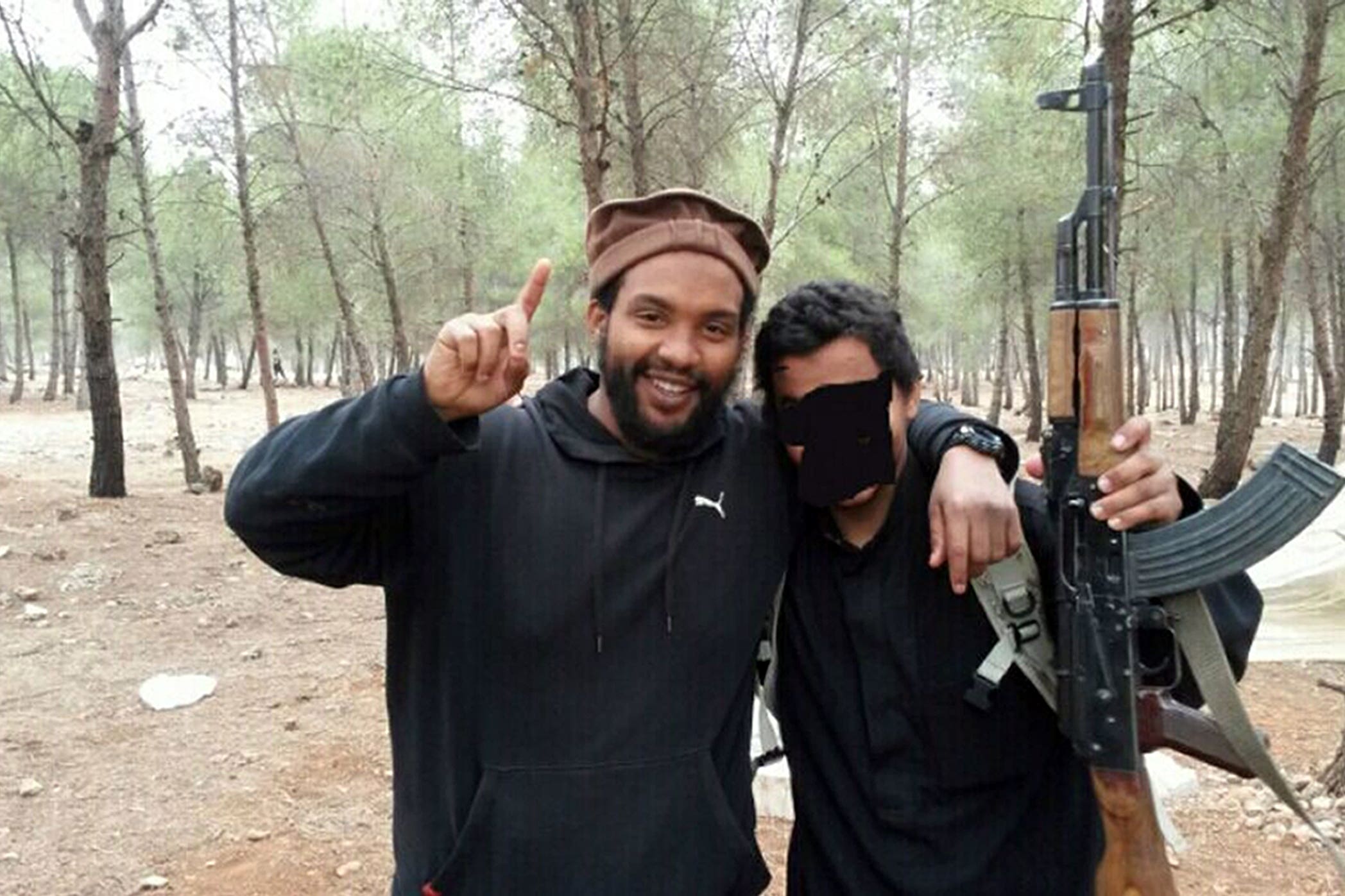Suspected ‘Isis Beatles’ cell member jailed on terrorism charges
Aine Leslie Davis last month admitted having a firearm for terrorist purposes and two charges of funding terrorism

A British Muslim convert suspected of being a member of an Isis death squad dubbed “The Beatles” has been jailed.
Aine Leslie Davis, 39, was deported from Turkey last August after serving a seven-and-a-half year sentence for membership of Isis.
On his arrival at Luton airport, he was detained by British counter-terrorism police and charged with three offences.

Last month, he admitted possession of a firearm contrary to Section 57 of the Terrorism Act 2000, and two charges of funding terrorism between 2013 and 2014.
The defendant, who was brought up in London, was sentenced to eight years at the Old Bailey on Monday.
It comes after Judge Mark Lucraft rejected Davis’s last-ditch attempt to get his case thrown out in March and an unsuccessful bid to overturn that decision at the Court of Appeal.
Davis’s legal team had claimed the prosecution should be halted because he could not be tried twice for the same offence.
He also accused British authorities of “conniving” with Turkish counterparts in his deportation in a failed bid by the then-home secretary Priti Patel to arrange his onward extradition to the US where two other IS Beatles were tried.

Ms Patel allegedly “begged” the US to take on the case of Davis, according to legal argument heard at the Old Bailey in March.
Davis’s barrister Mark Summers KC claimed lawyers in the US were not seeking to bring a prosecution against Davis “because the evidence was there were only three members and not four members of that cell”.
The barrister also claimed Ms Patel veered into “Alice in Wonderland territory” when she phoned authorities in the US begging them to take Davis’s case.
Mr Summers said: “The irregular personal involvement of the home secretary trying to persuade a foreign country to prosecute a UK national is frankly extraordinary.”
But, in a ruling published in the wake of Davis’s guilty pleas, the Lord Chief Justice of England and Wales Mr Justice Chamberlain and Lord Justice Fulford sided with Judge Lucraft and dismissed the defence claims.
Their ruling stated: “We agree with the judge that there is a wholesale lack of evidence of misconduct on the part of the then-home secretary and the relevant United Kingdom officials.”

The senior judges added that the “short-lived and discounted proposal” to prosecute Davis in the US was “irrelevant to his alleged unlawful deportation” and any discussions about it were “no more than a footnote in the history of the return of the applicant to the United Kingdom”.
Davis has always denied being connected with “The Beatles” cell – so-called because of their British accents – which tortured and beheaded Western hostages in Syria.
Two Isis Beatles members, British nationals El Shafee Elsheikh and Alexanda Kotey, are serving life in US jails.
The third Beatle, Mohammed Emwazi, dubbed “Jihadi John”, who was believed to feature in shocking videos of Isis beheadings of a number of captives, was killed in a drone strike in 2015.
Davis’s terrorist activities dated back to 2013 when he left his home in London and set off to join the armed conflict in Syria, having previously converted to Islam and spent time in the Middle East.
The evidence was largely uncovered from his communications with his then-wife, mother-of-two Amal El-Wahabi, 36, who stayed behind in north London, living on benefits.
He went on to enlist her in a plan to send him cash by hoodwinking her friend Nawal Masaad, 36, to act as courier on the promise of 1,000 euros.

Ms Masaad, from Holloway, north London, was stopped at Heathrow Airport on 16 January 2014 as she was about to board a flight to Istanbul with 20,000 euros stuffed inside her tights.
The prosecution alleged the money, raised in the UK, was destined to support Davis’s terrorist cause in Syria.
Following El-Wahabi’s arrest in London, police uncovered a stash of terrorist propaganda said to have been left behind by Davis when he went to Syria.
On her mobile phone was a picture sent by Davis in November 2013 in Syrian woods with a man holding a Kalashnikov rifle.
Davis told his wife: “Don’t show this to anyone but yuyu. (sic). I mean it.”
He sent another picture posing with 13 others in military-style clothes, all with guns held aloft.
Asked by El-Wahabi if he was doing anything exciting, Davis said he was just “on point”, which is believed to be a reference to guard duty.
The court heard it was clear that Davis – who had convictions for possession of drugs and gun possession – had gone to Syria to fight under the black flag of Isis and that he was preoccupied with martyrdom.
Giving evidence in her trial, El-Wahabi claimed Davis was “always there” for her and had left the country “to get away from everyone and to look for work”.
He was unhappy in London because of “the drugs, the influence of friends he has around him, the police targeting him constantly”, she said.
She added: “With him, his problem is he is always being watched.”
After the Old Bailey trial in 2014, El-Wahabi was found guilty of funding terrorism and jailed for 28 months, while Ms Masaad was cleared of wrongdoing.
El-Wahabi was the first person to be convicted of funding terrorism in Syria.
In November 2015, Davis was arrested with others in Istanbul after being found using a forged travel document and later jailed for Isis membership.
